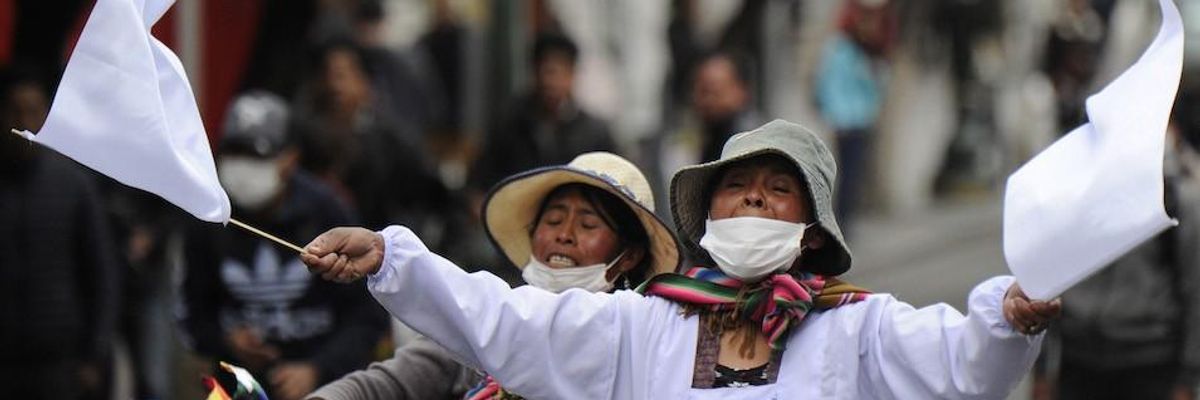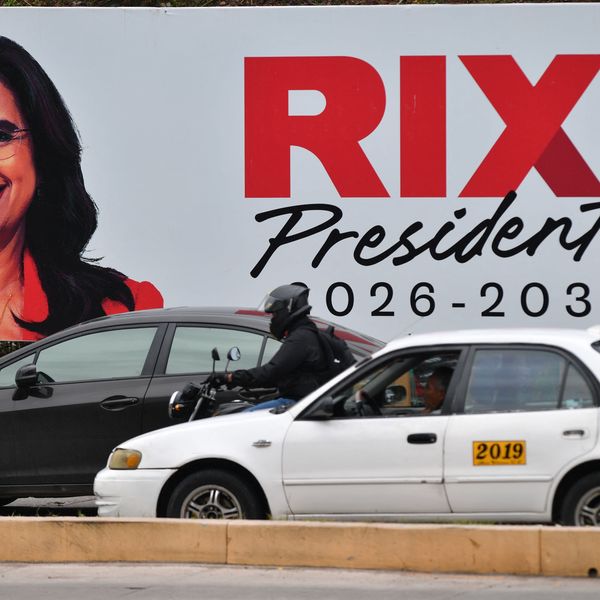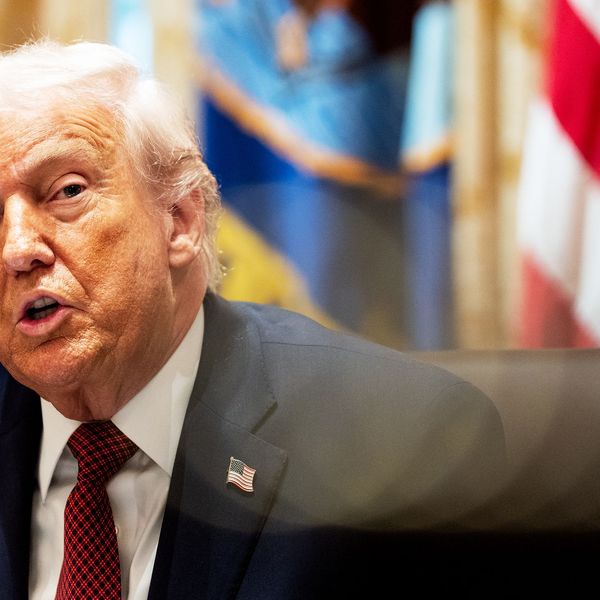
A supporter of Bolivian ex-President Evo Morales waves white flags during clashes with riot police following a protest in La Paz on November 13, 2019. (Photo: Jorge Bernl/AFP/Getty Images)
USAID Arriving in Bolivia to 'Monitor Elections,' Raising Fears of US Meddling in May 3 Vote
"The Trump administration has clearly picked sides."
Seven years after former President Evo Morales expelled the organization from his country, claiming it was undermining his government, USAID is returning to Bolivia at the invitation of Jeanine Anez's coup government to monitor elections in the Latin American nation set for May 3.
Officials from USAID and the U.S.-dominated Organization for American States (OAS) arrived in Bolivia Thursday to "give technical aid to the election process in Bolivia."
Students of history should approach these developments with a critical eye, said Latin American historian Thomas Field.
"With USAID and OAS assisting in the May 2020 election, we can be sure its goal will be similar to Bolivia's 1966 election (following 64 coup), which CIA steered to ensure country returned to constitutionality in way that meshed U.S. interests," Field tweeted.
\u201cUS embassy in Bolivia confirms that a technical team of 'experts in electoral systems and democratic strengthening,' including USAID reps, arrive in Bolivia today.\n\nThe mission will focus on assessing how the United States can support the May 3rd election.\nhttps://t.co/dgu3ihxvgY\u201d— Camila (@Camila) 1578580135
\u201c#BTVInforma | Los representantes de la @OEA_oficial, conformada por siete personas, lleg\u00f3 a #Bolivia y confirmaron que brindar\u00e1n apoyo t\u00e9cnico y cadena de custodia de las actas en las elecciones generales del pr\u00f3ximo 3 de mayo.\u201d— Bolivia tv Oficial (@Bolivia tv Oficial) 1578620031
The Morales government expelled USAID from Bolivia on May 1, 2013 due to the U.S. agency's repeated actions conspiring "against the people and especially against the country" of Bolivia.
The right-wing Anez government, which unilaterally declared its own legitimacy in November after toppling the democratically-elected Morales, has focused on privatizating Bolivian resources like the country's vast lithium deposits, the rolling back of Morales-era reforms, and closer ties to the U.S.
In remarks Thursday, Anez claimed that the country was on the up and up following the coup that led to Morales' resignation in November.
"Bolivia is experiencing a process of democratic recovery," said Anez. "I was reviewing studies of social behavior and the level of optimism and hope of Bolivians has increased in the last month."
President Donald Trump's White House has welcomed the change in Bolivia, though critics of Anez urged caution from Washington with respect to supporting the new government in comments to the Associated Press.
"The Trump administration has clearly picked sides," Kathryn Ledebur, director of the Andean Information Network, told AP. "But it should also highlight concerns about human rights violations and erosion of democratic rights."
Progressives questioned the motivation of the White House to send aid in advance of the election.
"Trump recently described this initiative of now giving aid to Bolivia as 'vital to the national interests of the U.S.,'" said one activist, "so you know, nothing good."
An Urgent Message From Our Co-Founder
Dear Common Dreams reader, The U.S. is on a fast track to authoritarianism like nothing I've ever seen. Meanwhile, corporate news outlets are utterly capitulating to Trump, twisting their coverage to avoid drawing his ire while lining up to stuff cash in his pockets. That's why I believe that Common Dreams is doing the best and most consequential reporting that we've ever done. Our small but mighty team is a progressive reporting powerhouse, covering the news every day that the corporate media never will. Our mission has always been simple: To inform. To inspire. And to ignite change for the common good. Now here's the key piece that I want all our readers to understand: None of this would be possible without your financial support. That's not just some fundraising cliche. It's the absolute and literal truth. We don't accept corporate advertising and never will. We don't have a paywall because we don't think people should be blocked from critical news based on their ability to pay. Everything we do is funded by the donations of readers like you. Will you donate now to help power the nonprofit, independent reporting of Common Dreams? Thank you for being a vital member of our community. Together, we can keep independent journalism alive when it’s needed most. - Craig Brown, Co-founder |
Seven years after former President Evo Morales expelled the organization from his country, claiming it was undermining his government, USAID is returning to Bolivia at the invitation of Jeanine Anez's coup government to monitor elections in the Latin American nation set for May 3.
Officials from USAID and the U.S.-dominated Organization for American States (OAS) arrived in Bolivia Thursday to "give technical aid to the election process in Bolivia."
Students of history should approach these developments with a critical eye, said Latin American historian Thomas Field.
"With USAID and OAS assisting in the May 2020 election, we can be sure its goal will be similar to Bolivia's 1966 election (following 64 coup), which CIA steered to ensure country returned to constitutionality in way that meshed U.S. interests," Field tweeted.
\u201cUS embassy in Bolivia confirms that a technical team of 'experts in electoral systems and democratic strengthening,' including USAID reps, arrive in Bolivia today.\n\nThe mission will focus on assessing how the United States can support the May 3rd election.\nhttps://t.co/dgu3ihxvgY\u201d— Camila (@Camila) 1578580135
\u201c#BTVInforma | Los representantes de la @OEA_oficial, conformada por siete personas, lleg\u00f3 a #Bolivia y confirmaron que brindar\u00e1n apoyo t\u00e9cnico y cadena de custodia de las actas en las elecciones generales del pr\u00f3ximo 3 de mayo.\u201d— Bolivia tv Oficial (@Bolivia tv Oficial) 1578620031
The Morales government expelled USAID from Bolivia on May 1, 2013 due to the U.S. agency's repeated actions conspiring "against the people and especially against the country" of Bolivia.
The right-wing Anez government, which unilaterally declared its own legitimacy in November after toppling the democratically-elected Morales, has focused on privatizating Bolivian resources like the country's vast lithium deposits, the rolling back of Morales-era reforms, and closer ties to the U.S.
In remarks Thursday, Anez claimed that the country was on the up and up following the coup that led to Morales' resignation in November.
"Bolivia is experiencing a process of democratic recovery," said Anez. "I was reviewing studies of social behavior and the level of optimism and hope of Bolivians has increased in the last month."
President Donald Trump's White House has welcomed the change in Bolivia, though critics of Anez urged caution from Washington with respect to supporting the new government in comments to the Associated Press.
"The Trump administration has clearly picked sides," Kathryn Ledebur, director of the Andean Information Network, told AP. "But it should also highlight concerns about human rights violations and erosion of democratic rights."
Progressives questioned the motivation of the White House to send aid in advance of the election.
"Trump recently described this initiative of now giving aid to Bolivia as 'vital to the national interests of the U.S.,'" said one activist, "so you know, nothing good."
Seven years after former President Evo Morales expelled the organization from his country, claiming it was undermining his government, USAID is returning to Bolivia at the invitation of Jeanine Anez's coup government to monitor elections in the Latin American nation set for May 3.
Officials from USAID and the U.S.-dominated Organization for American States (OAS) arrived in Bolivia Thursday to "give technical aid to the election process in Bolivia."
Students of history should approach these developments with a critical eye, said Latin American historian Thomas Field.
"With USAID and OAS assisting in the May 2020 election, we can be sure its goal will be similar to Bolivia's 1966 election (following 64 coup), which CIA steered to ensure country returned to constitutionality in way that meshed U.S. interests," Field tweeted.
\u201cUS embassy in Bolivia confirms that a technical team of 'experts in electoral systems and democratic strengthening,' including USAID reps, arrive in Bolivia today.\n\nThe mission will focus on assessing how the United States can support the May 3rd election.\nhttps://t.co/dgu3ihxvgY\u201d— Camila (@Camila) 1578580135
\u201c#BTVInforma | Los representantes de la @OEA_oficial, conformada por siete personas, lleg\u00f3 a #Bolivia y confirmaron que brindar\u00e1n apoyo t\u00e9cnico y cadena de custodia de las actas en las elecciones generales del pr\u00f3ximo 3 de mayo.\u201d— Bolivia tv Oficial (@Bolivia tv Oficial) 1578620031
The Morales government expelled USAID from Bolivia on May 1, 2013 due to the U.S. agency's repeated actions conspiring "against the people and especially against the country" of Bolivia.
The right-wing Anez government, which unilaterally declared its own legitimacy in November after toppling the democratically-elected Morales, has focused on privatizating Bolivian resources like the country's vast lithium deposits, the rolling back of Morales-era reforms, and closer ties to the U.S.
In remarks Thursday, Anez claimed that the country was on the up and up following the coup that led to Morales' resignation in November.
"Bolivia is experiencing a process of democratic recovery," said Anez. "I was reviewing studies of social behavior and the level of optimism and hope of Bolivians has increased in the last month."
President Donald Trump's White House has welcomed the change in Bolivia, though critics of Anez urged caution from Washington with respect to supporting the new government in comments to the Associated Press.
"The Trump administration has clearly picked sides," Kathryn Ledebur, director of the Andean Information Network, told AP. "But it should also highlight concerns about human rights violations and erosion of democratic rights."
Progressives questioned the motivation of the White House to send aid in advance of the election.
"Trump recently described this initiative of now giving aid to Bolivia as 'vital to the national interests of the U.S.,'" said one activist, "so you know, nothing good."

